During Great Lent the Liturgy of Saint Basil the Great is prayed at Divine Liturgy and not the Liturgy of Saint John Chrysostom.
Sunday, 3/05/17 First Sunday of Lent — The Sunday of Orthodoxy
9:00 a.m. PRO POPULO
10:30 a.m. God’s blessing and health for Anna requested by Maria Wysowskyj
Epistle: Hebrews 11:24-26, 32-12:2
Gospel: John 1:43-51, Tone 1
Monday, 3/06/17 The 40 Martyrs of Ammorium
8:00 a.m. +Sophie Plachtyna requested by Sestrichi
Tuesday, 3/07/17 The Holy Priest-Martyrs and Bishops of Cherson
8:00 a.m. +Eugenia Harvey (Pan.) requested by Carl Harvey
Wednesday, 3/08/17 Our Venerable Father and Confessor Theophylactus
8:00 a.m. +Helen Wasylyk requested by Sestrichi
Thursday, 3/09/17 The Holy 40 Martyrs of Sebaste
8:00 a.m. +Catherine Levitzky (Pan.) requested by Joseph M. Levitzky
Friday, 3/10/17 The Holy Martyr Condratus, Cyprian and those with him
7:00 p.m. Liturgy of the Pre-Sanctified Gifts
Saturday, 3/11/17 Our Holy Father Sophronius, Patriarch of Jerusalem
8:30 a.m. For All deceased members of the Parish
9:00 a.m. Sorokousty
9:30 a.m. +Myron Gali (29th Anniv., Pan.) requested by Anastazia Gali
Sunday, 3/12/17 Second Sunday of Lent —Commemoration of St Gregory Palamas
9:00 a.m. PRO POPULO
10:30 a.m. Thanksgiving Divine Liturgy requested by Maria Wysowskyj
Epistle: Hebrews 1:10-2:3
Gospel: Mark 2:1-12, Tone 2
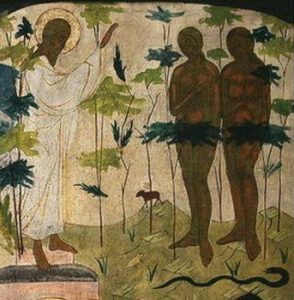 “When you fast, do not look gloomy like the hypocrites.” (From today’s Gospel, Matthew 6:16)
“When you fast, do not look gloomy like the hypocrites.” (From today’s Gospel, Matthew 6:16)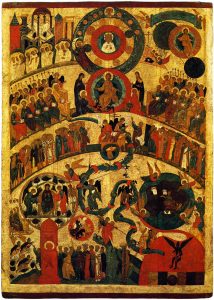 In our preparation for the Great Fast,
In our preparation for the Great Fast,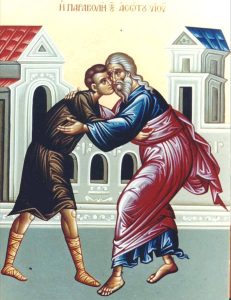 The parable read today is usually called “the parable of the Prodigal Son,” who is at the center of the story. It might also be called “the parable of the Merciful Father,” who welcomes back his son, embracing him, restoring him to his position, declaring a joyous celebration without even seeming to hear or listen to his son’s confession or protestation. It might also be called “the parable of the Petulant Son,” who is grumpy and peeved at the fat
The parable read today is usually called “the parable of the Prodigal Son,” who is at the center of the story. It might also be called “the parable of the Merciful Father,” who welcomes back his son, embracing him, restoring him to his position, declaring a joyous celebration without even seeming to hear or listen to his son’s confession or protestation. It might also be called “the parable of the Petulant Son,” who is grumpy and peeved at the fat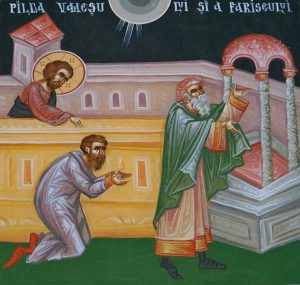 This Sunday’s Gospel begins our preparation for the Great Fast. It seems to turn the whole purpose of the Fast on its head. The Pharisee boasts of “fasting twice a week,” and “giving tithes of all I possess,” and thanks God that he is not like other men. But Jesus says he is not justified. Our Lord does not speak of how these two men lived their lives outside the temple. He does not speak explicitly of whether the tax collector repented, thou
This Sunday’s Gospel begins our preparation for the Great Fast. It seems to turn the whole purpose of the Fast on its head. The Pharisee boasts of “fasting twice a week,” and “giving tithes of all I possess,” and thanks God that he is not like other men. But Jesus says he is not justified. Our Lord does not speak of how these two men lived their lives outside the temple. He does not speak explicitly of whether the tax collector repented, thou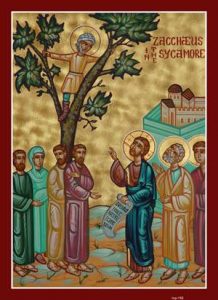 Meditation on Sunday’s Scripture readings 1 Timothy 4:9-16; Luke 19:1-10
Meditation on Sunday’s Scripture readings 1 Timothy 4:9-16; Luke 19:1-10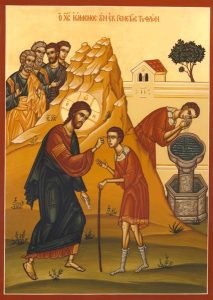 1 Timothy 1:15-17; Luke 18:35-43 (Readings of the 31st Sunday after Pentecost)
1 Timothy 1:15-17; Luke 18:35-43 (Readings of the 31st Sunday after Pentecost)